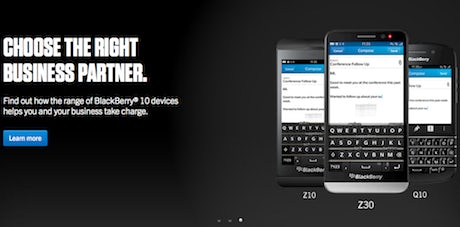BlackBerry’s decline continues after reporting $4.4bn loss
BlackBerry’s losses widened in its third quarter after it reported a huge shortfall in revenue having sold far fewer smartphones than in previous years – but its new CEO John Chen remains upbeat and has insisted its new organisational structure means its performance will improve in 2014.

BlackBerry’s revenue fell 24 per cent on the previous quarter and 56 per cent year on year to $1.2bn – well below analysts’ estimates of $1.6bn.
BlackBerry “recognised revenue” on just 1.9 million smartphones in the period, compared with 3.7 million in the previous quarter. In total it sold 4.3 million phones, but fewer than one quarter (1.1 million) of device sales were those running the BlackBerry 10 operating system, which it has been supporting with multi-million dollar marketing campaigns throughout 2013.
The company, which spent much of the quarter exploring a potential sale before opting for a $1bn financing round, reported a (US)$4.4bn loss in the three months to 30 November. It had reported a 2 per cent profit in the same quarter a year earlier.
BlackBerry’s strategic outlook
BlackBerry replaced its former CEO Thorsten Heins with John Chen in November this year. Since then Chen has been responsible for steering the company back to its business roots in order to secure its future, having seen its consumer smartphone market share plummet over the past year.
In an analyst and press call after the release of the third quarter results, Chen attempted to explain the company was not backing out of the consumer market altogether but that it would now look to reach consumer and mass audiences through partnerships rather than through its brand alone.
This could include brand partnerships via its BBM messaging service, which the company expects to monetise in the fiscal year 2016 through its “BBM Channels”.
Chen said the company would now be focused on serving the enterprise mobility sector and the “highly secure strategic environment”.
He added: “This is a time for us to come out and articulate our value, technology, reach and heritage.”
BlackBerry’s organisational restructure
Since Chen’s appointment BlackBerry has seen an exodus of c-suite executives, who have been replaced with counterparts more experienced in the B2B space. Yesterday (19 December) it appointed B2B marketing veteran Mark Wilson to the newly created role of senior vice president for marketing, who will help shape the company’s new enterprise vision.
BlackBerry’s loss was mostly the result of charges incurred in the restructure of the business – which has seen it shed thousands of jobs and scrap the CMO role among other executive positions. It also had impairments associated with its “strategic review process” which eventually resulted in it abandoning a sale plan. The company also took write downs on its long-lived assets, inventory and supply commitments.

In a statement accompanying the results Chen says: “With the operational and organisational changes we have announced, BlackBerry has established a clear roadmap that will allow it to target a return to improved financial performance in the coming year. While our enterprise services, messaging and QNX Embedded businesses are already well-positioned to compete in their markets, the most immediate challenge for the company is how to transition the devices operations to a more profitable business model.
“We have accomplished a lot in the past 45 days, but still have significant work ahead of us as we target improved financial performance next year. However, the company is financially strong, has a broad and trusted product portfolio to work with, a talented employee base and a new leadership team dedicated to implementing our new roadmap.”
BlackBerry Foxconn partnership
To help meet the challenge of transitioning its device business from a loss-making arm into a profitable one, BlackBerry today (20 December) announced a five-year partnership with electronic and component manufacturer Foxconn, which manufactures Apple’s iPhones among products for other technology companies.
Under the deal, Foxconn will jointly develop and manufacture certain new BlackBerry devices and manage the inventory associated with them, giving BlackBerry more legroom to develop solutions in its server and software business. The initial focus of the partnership will be developing a smartphone for Indonesia and other “fast-growing markets”, a BB10 device due for release in “March or April” 2014.
Chen says the partnership demonstrates “BlackBerry’s commitment to the device market for the long-term” and its “determination to remain the innovation leader in secure end to end mobile solutions”.






